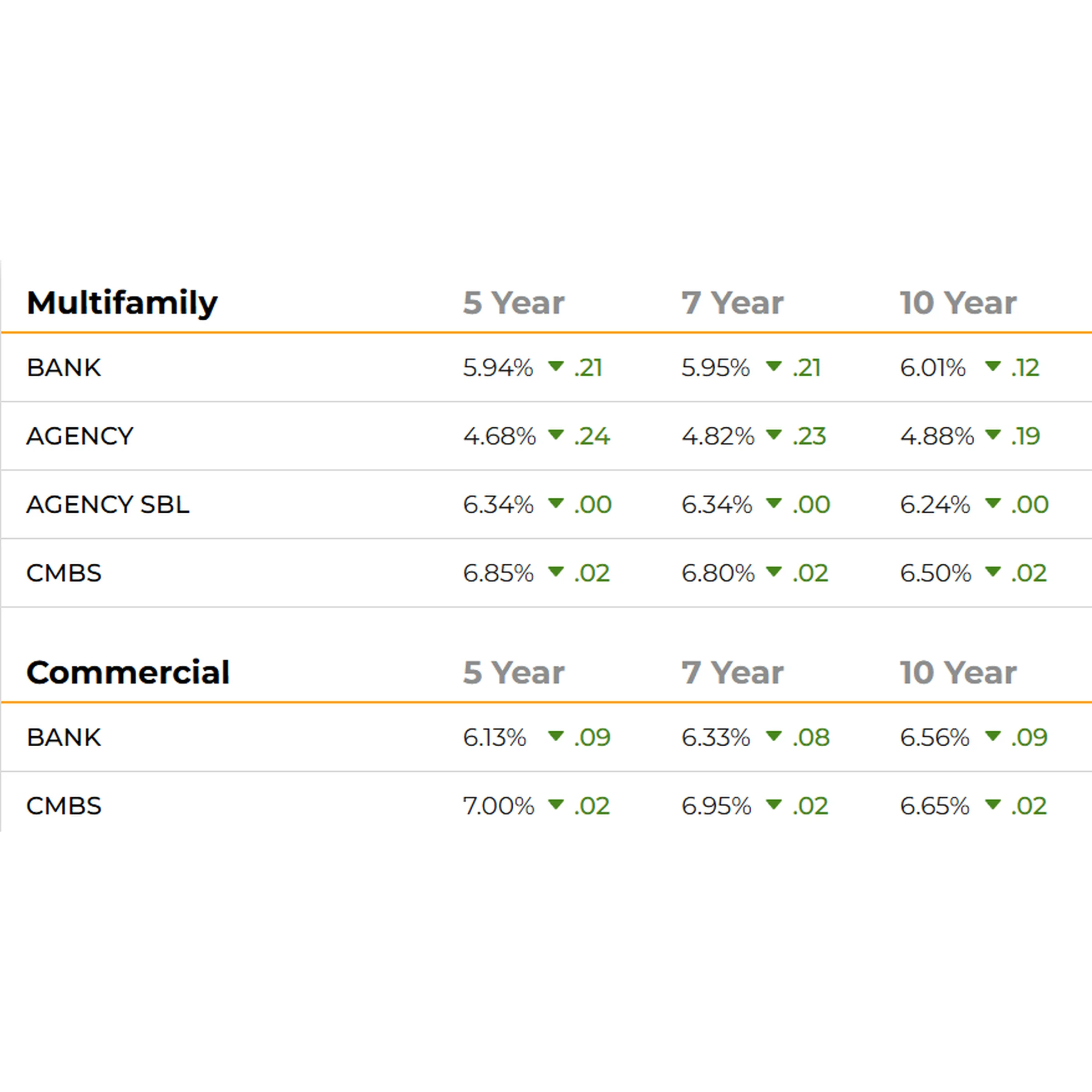
Commercial real estate loans are for purchasing a property such as an office space, retail space, or apartment building to lease out to tenants. In most cases, you can take out a real estate loan of up to $5.5 million, with interest rates beginning around 5%. Repayment terms can vary but can usually extend up to 25 years.
It is essential to know that loan-to-value (LTV) ratios of property loans are generally 65%-75%, which means the down payment will be at least 25% of the purchase price. Read on for a breakdown of the most used CRE loans and what to remember when seeking commercial real estate lending.
Benefits of Commercial Real Estate Financing
There are several benefits to taking out a commercial real estate loan. The most crucial advantage is establishing ownership of the property with a small down payment, with the ability to collect rental income and build equity over the long term.
You often have lower interest rates and fixed monthly payments to help you plan for upcoming expenses. You can pay for your commercial mortgage over the years, which helps you focus on essential business details without stress.
Benefits of Using OPM
Investing with OPM or other people’s money can unlock several benefits. Investing with other people’s money allows you to make more without spending all of your own money.
Earning a return on investment, or an ROI, is the ultimate goal when investing in commercial real estate. Using OPM finance can drastically increase your cash return on investment.
What is Leverage?
Leverage is when you use borrowed capital to increase your real estate investment return. While leverage can provide excellent returns, it can also lead to loss if the real estate industry enters a downward cycle. Staying abreast of macro and local commercial real estate trends can keep you aware of what the future may bring.
What are the Common Types of Commercial Real Estate Loans?
There are several types of commercial real estate loans you can apply for. The most common ones include SBA, permanent, hard money, blanket, and bridge loans.
SBA Loans
The SBA (United States Small business Administration) provides two types of business loans for commercial real estate financing: SBA 7(a) and SBA 504.
Before applying for an SBA loan, you will need to make sure you have the following:
| Business Plan | Good Credit | Know the Amount You Need | Collateral |
|---|---|---|---|
| You must provide your lender with a business plan when applying. The SBA’s website has a free business plan guide. | Lenders will look at your credit history to determine your credit risk and interest rates. | You need to know how much money you will need and how an SBA loan will benefit your company. You will also need to show how you will use the funds and how you will pay for the loan. | Often, you will need to provide your home or other types of collateral to take out a loan. |
SBA 7(a)
The SBA 7(A) is the most popular out of the two different SBA loans due to its flexibility. It is usually for longer-term business financing.
The maximum amount you can take out for an SBA loan is usually $5 million. There is also an SBA Express loan with a maximum of $350,000, and SBA Export Express loans have a maximum of $500,000. The maximum maturity for SBA loans for real estate is 25 years.
The borrower and lender negotiate the interest rates, though they need to consider the SBA maximums. According to the SBA website, the chart below shows mortgage rates for variable-rate loans:
| Loan Amount | Max rate if maturity is less than 7 years | Max rate if maturity is more than 7 years |
| $25,000 or less | Base rate plus 4.25% | Base rate plus 4.75% |
| $25,000 to $50,000 | Base rate plus 3.25% | Base rate plus 3.75% |
| $50,000 or more | Base rate plus 2.25% | Base rate plus 2.75% |
SBA 504
504 loans provide fixed-rate financing of up to $5 million for significant fixed assets where businesses can grow and create jobs. An example of these fixed assets would be existing land or buildings.
You can get a 504 loan through Certified Development Companies known as CDCs. Certified Development Companies are community-based partners regulated by the SBA and promote economic growth inside their communities.
When applying for an SBA 504, you must show proof that you have management experience, provide a business plan, and qualify as a small business before getting credit approval.
Permanent
Despite its name, a permanent loan is not unlimited, but it does have an unusually long term. Real estate developers secure permanent loans once a construction project is finished and investors purchase an existing commercial property for sale. These loans take the place of a construction loan and generally have loan terms of between 5-10 years, with amortization rates of between 20-30 years.
Hard Money
Hard money loans are issued by private companies and individuals instead of by traditional lenders such as banks. This short-term loan is popular with real estate investors who don’t plan on holding onto the property for a long period. Hard money loans typically last between three and 36 months.
Blanket
A blanket loan is used mostly by builders and developers to purchase multiple real estate pieces.
What separates a blanket mortgage from a traditional mortgage is the release clause. The client can sell a property and release their liability for that part of the mortgage. This allows the person to sell the property without repaying the loan in full or having to refinance each time they sell.
Bridge
Bridge loans are a short-term financing option often used to cover the gap between a development loan and permanent financing can be secured. These short-term loans usually last between six to twelve months and have higher interest rates than traditional loans, usually ranging between 8.5% and 10.5%.
Business Line of Credit
A business line of credit is a less common loan to cover short-term costs. These loans do not provide the borrower with a lump sum, so you only pay interest on what you withdraw.
Business lines range anywhere from a couple of months to 10 years, with interest rates starting at 7%. The downside is that it can be hard to get a business line of credit with a bank, and online lenders can have interest rates ranging from 8% to 80%. Due to the low availability and high-interest rates, a business line of credit should be for highly short-term needs such as emergency expenses or buying inventory.
Where Can You Find Commercial Real Estate Loans?
There are several options to choose from when it comes to finding investment property loans. It is essential to thoroughly research your choices and compare commercial loan rates from different lenders.
Commercial Lenders
Commercial lenders offer a handy choice for those who need a real estate loan quickly for their small or medium-sized company. Commercial lenders typically have lower fees and closing costs, but their interest rates are usually higher than loans from banks. Also, most loans from commercial lenders are short-term, so this might not be for you if you are looking for a long-term loan.
Banks
Banks provide commercial loans for different kinds of properties, including long-term financing. The standard loan amount for a bank loan is usually $1 million, and your bank may provide a discount if you are already a customer.
When taking out a commercial real estate loan with a bank, expect it to be fairly slow. You will need to provide ample documentation, and the bank will approve or decline your loan based on your credit. If your credit score is less than 620, this might not be a good option.
SBA Lenders
Traditional banks can often provide an SBA loan, or you can go through an online lender that offers these types of loans. SmartBiz is a great option. However, the SBA website has a valuable lender match tool to help you find a local SBA lender.
The Bottom Line
Investing in commercial real estate property can be a rewarding and enjoyable experience when you are adequately prepared. Before you get involved with purchasing any property, you need to figure out how you will pay for your investment. Before deciding, weigh your options and compare interest rates, costs, requirements, and more with each bank or lender.
Source: The Most Common Types of Commercial Real Estate Loans | Crexi Insights
https://www.creconsult.net/market-trends/the-most-common-types-of-commercial-real-estate-loans/
No comments:
Post a Comment